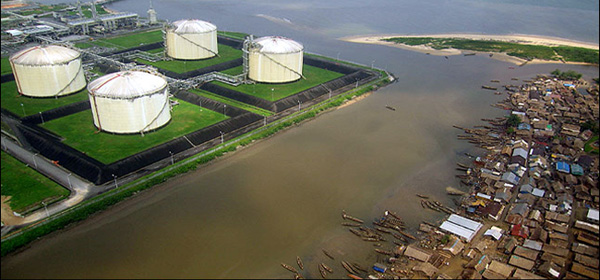- Washington “follows with interest” Morocco’s openness onto Africa (John Kerry)Posted 11 years ago
- The trial of South African Paralympic champion Oscar Pistorius opened in Pretoria on Monday.Posted 11 years ago
- USA welcomes efforts of King Mohammed VI in MaliPosted 11 years ago
- Egypt’s population reaches 94 millionPosted 11 years ago
- Mugabe celebrates his 90thPosted 11 years ago
- Moroccan Monarch to Build a Perinatal Clinic in BamakoPosted 11 years ago
- King Mohammed VI handed a donation of bovine semen for the benefit of Malian breeders.Posted 11 years ago
- Moroccan King’s strategic tour to Africa: Strengthening the will of pan African Solidarity and stimulating the south-south cooperation mechanisms over the continentPosted 12 years ago
- Senior al-Qaida leader killed in AlgeriaPosted 12 years ago
- Libya: The trial of former Prime Minister al-Baghdadi AliPosted 12 years ago
Nigeria: a lot of oil and little development
 Fifty years after independence, Nigeria, the most populous country of Africa, a heavy oil producer with 150 million inhabitants, is still living almost in recurrent electricity black outs and shortages. The former British colony only produces about 3 500 megawatts of electricity per day. This production is far below the needs of the Nigerians and by way of comparison, South Africa is producing about 43 000 megawatts for the 50 million inhabitants.
Fifty years after independence, Nigeria, the most populous country of Africa, a heavy oil producer with 150 million inhabitants, is still living almost in recurrent electricity black outs and shortages. The former British colony only produces about 3 500 megawatts of electricity per day. This production is far below the needs of the Nigerians and by way of comparison, South Africa is producing about 43 000 megawatts for the 50 million inhabitants.
That is the paradox of the eighth largest exporter of crude that derives about 80% of its revenues from oil extracted from the Niger Delta oil region in the south. Actually, the Africa’s top crude oil producer pumps about 2.14 million barrels per day, but the billions of petrodollars achieved were not synonymous with development for the giant federation. The country’s infrastructure is in disrepair and much of the population lives in poverty. Major industries, primarily agriculture, highly developed in the recent past, have been neglected in favour of the emergence of a “single economy” that has enriched very tiny, but powerful elite. Professor of international relations, at the Covenant University in Ogun State (southwest), Daniel R. Omoweh, has declared that the oil sector has been mismanaged by the federal government and the political elite. This fact has been confirmed by the well known economist and presidential candidate in 2011, Pat Utomi, who estimates that the nation is currently headed by “all sorts of thieves”. He added the country would be better left without oil and the widespread corruption that has developed over decades, especially during the military regimes. Another paradox is the importation of fuel because the Nigerian four refineries do not work, and this other fact pushed the former Minister, Femi Okunnu, 77 years old to say: “In our dreams, Nigeria would have become the African power, a power that the world would rely on politically… Unfortunately, we lost our time and resources, he said.
The Niger Delta populations are very poor and say they have been impoverished by oil that has polluted their waters and lands. It has become a hotbed of violence for years. Nigeria’s production has been plagued by years of attacks on vulnerable pipelines and platforms in the Delta, which increased in intensity from mid-2006, allowing Angola briefly to become the continent’s top crude oil producer. Armed groups are still claiming a fairer distribution of the oil wealth. The presidential amnesty offered to militants has led to a relative stability since June 2009, and parliament is currently considering a draft reform of the sector that could improve the situation and ensure better revenue management of crude. But success hangs on sustained peace in the Niger Delta, which will be tested by elections early next year.
